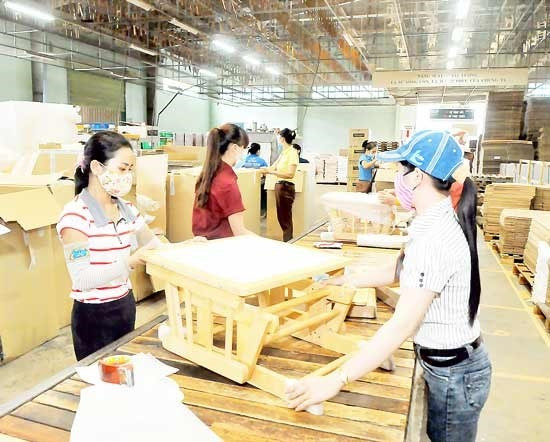AVPA is a voluntary trade agreement between the EU and countries making woodenproducts to promote trade in legal timber and ensure only legally harvestedtimber is imported into the EU from these countries.
Vietnamand EU concluded VPA negotiations last month.
Accordingto delegates, the forest pact would increase the competitiveness of Vietnamesetimber products compared to those from countries that do not have much controlover the forestry sector.
Speakingat a seminar on promoting furniture and handicraft exports to European market,Jana Herceg, deputy head of the trade and economic section of the Delegation ofthe European Union to Vietnam, said Vietnam is the second country in ASEANafter Indonesia to conclude this agreement.
Sowhen the VPA-FLEGT agreement takes effect, it would further boost the export offurniture products, she said.
Europeanconsumers want to know about labour conditions and corporate socialresponsibility standards, she said.
IfVietnamese companies understand consumers demand and meet these conditions,they have the opportunity to boost exports to Europe, she said.
Topenetrate the market, good quality is the first thing firms need to have, shesaid.
“Onceyou have the products you have to make sure that people know about yourproducts, you need to have good marketing and good branding.”
BuiThi Viet Anh of the Institute of Policy and Strategy for Agriculture and RuralDevelopment said VPA-FLEGT certificates would help increase opportunities toexport to other important markets.
Butthe process is relatively complicated, and increases costs and administrativeprocedures in Vietnam, she said.
Enterprisesalso face trade barriers and intense competition from other exporters to themarket, which require them to improve quality, access to information andcompetitiveness.
Theyneed to ensure legal timber sources by increasing import of raw materials fromlow-risk countries, connecting with importers in developed countries, andinvesting in timber growing in Vietnam, she said.
NguyenChanh Phuong, deputy chairman of the Handicrafts and Wood Industry Associationof HCM City, said besides branding, product design and price are two importantfactors in the competitiveness of the wooden sector.
Europeanconsumers’ habits are changing, and exporters need to catch up on these trends,he said.
JohannesSchwegler of the Swiss Import Promotion Programme said there is an emergingtrend of using laminated flooring and bamboo products as substitutes fortropical timber because of their environmental-friendliness and technicalproperties.
Solidwood-based products, which are the strength of Vietnamese firms, still haveopportunities for growth, but Vietnamese firms should keep abreast of markettrends, he said.
Bui Thi Thanh An, deputy director general of Vietnam Trade Promotion Agency,said exports of wood and wooden products were worth nearly 7 billion USD lastyear.
TheEU is currently the fourth largest importer of Vietnamese wood and woodproducts. It is also one of Vietnam’s timber suppliers.
Prospectsfor exporting furniture to the EU this year are good, she added.-VNA





























